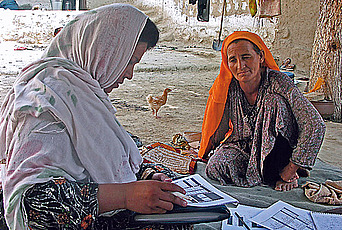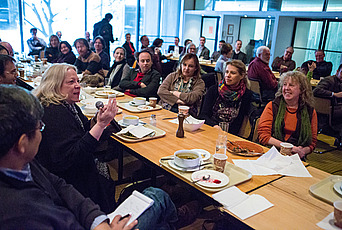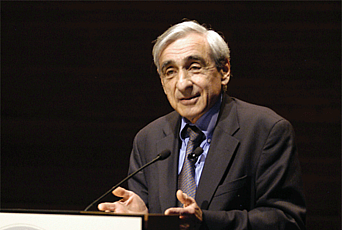Afghanistan and Iraq: Failed States or Failed Wars?

Lakhdar Brahimi, former Special Advisor to the Secretary-General of the United Nations, has spent the last year as a Director’s Visitor at the Institute for Advanced Study, participating in the School of Social Science’s program on “The ‘Third World’ Now” and delivering the Institute’s first Lecture on Public Policy. The new annual lecture series will elucidate and weigh in on issues relevant to contemporary politics and social conditions, as well as address scientific matters of broad import every few years.
Born in Algeria and educated in Algeria and France, Ambassador Brahimi has participated in and influenced world affairs for more than five decades, in Afghanistan, Algeria, Haiti, and Lebanon, among other countries. In February 2004, a few months after the assassination of Sergio Vieira de Mello and twenty-two of his colleagues in Baghdad, Brahimi led the efforts of the United Nations in the early part of the postwar transition in Iraq. In his March 28 Public Policy Lecture “Afghanistan and Iraq: Failed States or Failed Wars?” Brahimi, who also assisted in the postwar transitions in Afghanistan, spoke about the circumstances that have led to the present crisis in the Middle East.
“When I was in Afghanistan, in 2002 and 2003, I used to argue that no comparison between Iraq and Afghanistan was justified,” said Brahimi. “Iraq looked very much like an anachronistic colonial enterprise that, obviously, could simply not be compared to Afghanistan.” Yet, Brahimi continued, “Afghanistan and Iraq are now a sort of Siamese twin joined to one another by Iran, the U.S. presence, and Al-Qaeda. Things are bad in Iraq and getting bad in Afghanistan, to a point where, even in the West, fear is now expressed that the U.S. and its allies may end up losing in both countries.”
After twenty-five years of coups d’etat, Soviet occupation, and civil wars, Afghanistan was largely a failed state in the last quarter of 2001. Brahimi presided over the UN Bonn Conference on Afghanistan at the end of 2001, which produced the peace agreement known as the Bonn Process. During 2002 and 2003, he oversaw the agreement’s implementation as head of the UN Assistance Mission for Afghanistan in Kabul. “What has been achieved is not negligible,” said Brahimi, pointing to Afghanistan’s adoption of a constitution, the holding of presidential and parliamentary elections, and various social and economic improvements.
But one of the biggest failings in the implementation of the Bonn process, Brahimi said, is the poor achievement in national reconciliation. “Afghanistan had been the scene of all sorts of conflicts for twenty-five years. A patient and persistent effort was and is still needed to heal the wounds Afghans inflicted on one another. Not much has been done, unfortunately,” said Brahimi. “In particular, the government, and even more so its international partners, have not looked as closely as they should have to the Taliban problem.”
When, immediately after 9/11, the Taliban administration was routed by the U.S.-led military intervention, “not many people, Afghan or foreign, gave much thought to what had happened to them,” Brahimi said, “everyone was satisfied that Afghanistan had seen the last of the Taliban. Yet the Taliban did not surrender and did not recognize defeat. They succumbed to superior force but it is now plainly evident that, in typical Afghan fashion, they were determined to fight another day.”
The Taliban, a regime hostile to India, has had a friend in Pakistan, which was created at the partition of India in 1947. “Predictably, some in Pakistan would think of turning again to the Taliban and supporting them, perhaps even encouraging them—to revive their activities in Afghanistan,” said Brahimi. “Predictably, too, the Pakistani establishment would be careful to create conditions of deniability for their activities.” The U.S. paid little attention “to persistent allegations that Pakistan was supporting the slowly resurgent Taliban insurrection and the fact, amply documented, that quite a few Taliban leaders were openly moving around in Pakistan,” Brahimi said. The outcome is that today, Afghanistan is again “struggling with its old demons of internal strife. The Taliban, as well as other enemies of the new Afghan State and its international backers, are seriously threatening the modest achievements and fragile institutions that have emerged in the course of the past five years.”
Two disastrous wars and thirteen years of crippling UN sanctions, followed by foreign invasion and occupation, meanwhile, have destroyed Iraq, a state once considered on the verge of economic take-off in the 1970s, Brahimi said. “Today chaos rules supreme and Iraq has become the scene of a savage civil war and a growing menace to peace and stability in the whole region.”
Brahimi noted that the political debate in the United States (and to a lesser extent in Britain) “has ceased a long time ago to be about Iraq. The debate is now mainly about the problems the United States and the United Kingdom created for themselves because they started this war.” Which points to Brahimi’s first question: “Why did the United States invade Iraq in the first place? Maybe I am naïve or stupid or both to be asking this question so late in the day. But I do confess that I have not heard one satisfactory answer to this basic question anywhere.”
Whether Iraq was invaded for oil or to establish U.S. military bases, to promote democracy or to fight international terror, the reality, Brahimi said, is that Al-Qaeda, which “had no presence whatsoever in Iraq before this war” now “may well be stronger in Iraq than it is in Afghanistan.” Furthermore, Brahimi noted, “the invasion of Iraq has literally given a shot in the arm of Al-Qaeda worldwide.”
According to Brahimi, an unknown tally of Iraqis, perhaps as high as 600,000, have been killed since the beginning of the war; the country is patrolled now by some 330,000 Iraqi forces and counting, many of them controlled by militias; two million Iraqis have been displaced internally, while another two million have sought refuge in neighboring countries; hundreds of University professors and scientists have been assassinated; between $100 billion and $200 billion in property damage has been incurred; and Al-Qaeda factions are now directly and openly running some districts in Iraq, not only in Al Anbar Province along the Syrian and Jordanian borders, but also in Baaquba and other places around Baghdad.
It is now up to the region to fix the present crisis in Afghanistan and Iraq, Brahimi said. “Both India and Pakistan must agree not to use the territory or the people of Afghanistan against one another. And the U.S., together with the United Nations, the European Union, and the countries that are most actively engaged in Afghanistan, should patiently but firmly bring all these parties to cooperate effectively to help establish peace in Afghanistan.”
As for the future of Iraq, Brahimi believes the region “can fix what the Americans have broken. I am also confident that they fully understand that they cannot do it without the Americans, even less, of course, against the Americans. Three countries should take the lead: Iran, Saudi Arabia, and Turkey. It is not easy, but I sincerely believe it can be done.”


